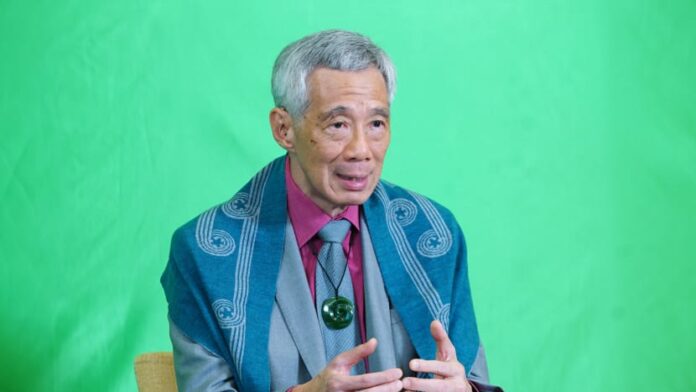Singapore: Singapore’s Prime Minister Lee Hsien Loong told APEC leaders on Friday that as people learn to live with COVID-19, international cooperation is the “key” to help the Asia-Pacific region recover and build a stronger economy (November 12) .
He was speaking at the APEC Leaders’ Meeting, which was hosted by New Zealand Prime Minister Jacinda Ardern and held in a virtual way.
In his speech, Mr. Lee praised New Zealand’s outstanding leadership as the chair of APEC, saying that it “inspires us to cooperate during the pandemic.”
He also emphasized that measures should be taken to help the Asia-Pacific region recover, starting with the gradual reopening of borders.
“Now our vaccination is being carried out at a steady rate, which can be done safely,” he said. “Many economies have introduced travel routes for vaccinated passengers and are eager to expand this range.”
He added that Singapore has already done so with several APEC economies, including one with Malaysia soon.
However, he said that there will be a complication between economies that have adopted the “zero COVID” strategy and those that have transitioned to coexist with the virus.
“Between these two groups of economies, strict border measures will be inevitable for some time to come,” he said.
“Nevertheless, we must recognize the importance of reopening our borders: rebuilding our economy, supporting our business, especially in the MICE (meetings, incentives, conferences and exhibitions) and tourism sectors, and enabling families to reconnect. “
He added that APEC is “a good platform for sharing ideas and best practices on how to safely reopen borders”.
Mr. Lee also encouraged economies to accelerate the mutual recognition of digital health certificates and continue to interact with the business community through the APEC Business Advisory Committee.
Second, APEC should strengthen the reliability of the supply chain, he said.
“The pandemic has prompted economies to re-examine the resilience of their supply chains, including onshore production chains and means to strengthen network reliability,” said Mr. Lee.
“But in doing so, we should not go to extremes. The government will play an active role in intervening to strengthen the supply chain.
“But in many cases, free markets and globalization will actually produce reliable, diversified and efficient supply networks, which are more responsive and economical than direct state intervention.”
Mr. Lee added that the economies should also “work together to maintain the resilience and openness of the supply chain.”
He said: “We need to develop strong connectivity to ensure seamless trade flows.” “Even during a crisis, trust can be built by keeping cross-border goods and services unimpeded.”
Lee Hsien Loong pointed out that APEC economies have shown solidarity and made good progress.
He cited the “Declaration on Promoting the Circulation of Basic Commodities” adopted in July last year and the statement on the COVID-19 vaccine supply chain reached this year as examples.
“In addition to the crisis, our support for multilateral institutions such as the World Trade Organization (WTO) and trade liberalization should be complemented by an open emphasis on supply chain resilience,” he said.
Third, APEC members should deepen regional economic integration.
He said: “APEC members have taken encouraging steps to realize the vision of the Asia-Pacific Free Trade Area.”
These include the “Trans-Pacific Partnership Comprehensive Progress Agreement” and the “Regional Comprehensive Economic Partnership Agreement” (RCEP) and other agreements.
The RCEP is composed of a “large” number of APEC members, accounting for 30% of the global gross domestic product (GDP), and will take effect on January 1.
“We should further advance the Asia-Pacific Free Trade Area on the basis of these major plans,” he said.
Mr. Li said that the economy must also “look to the future and seize opportunities in new growth areas.”
He emphasized that the digital economy is such an area, and pointed out that it has “huge economic potential.”
“By 2025, the annual ICT (information and communication technology) expenditure in the Asia-Pacific region will exceed US$1 trillion,” he said. “In Southeast Asia alone, the Internet economy is expected to exceed US$300 billion per year.”
He added that economies must support their businesses and people in the transformation.
He said: “We need to invest in improving the skills of our workforce and prepare them for the digital age.” “We need to build a public digital infrastructure to promote greater interoperability between economies. We need to adjust us Digital rules and standards to facilitate cross-border data flows.
“APEC members should strengthen cooperation in the field of digital economy and strive to reach a regional digital economy agreement (DEA).”
There is a DEA between Singapore and Australia, and there is a Digital Economy Partnership Agreement (DEPA) between Chile, New Zealand and Singapore.
Mr. Lee said that one way to reach a regional digital agreement is to expand the existing DEPA.
“Alternatively, we can develop a new agreement with a wider range of members. These two approaches are not mutually exclusive and can become the cornerstone of a larger regional or global digital architecture,” he said.
Mr. Lee also emphasized that climate change and green economy are an important area, saying that climate change is a “complex problem without simple solutions.”
He added that there are opportunities for cooperation, such as low-carbon solutions, and new capabilities in areas such as green finance and carbon trading services.
“APEC can become an incubator for new ideas, pioneering innovative solutions and establishing common rules and standards in a green economy,” he said.
“Singapore has launched our Green Plan 2030 and is discussing green economy agreements with like-minded partners.
“We are happy to share our experience and learn from others to improve our lives, strengthen our interdependence, and create prosperity, stability and peace in the Asia-Pacific region.”






